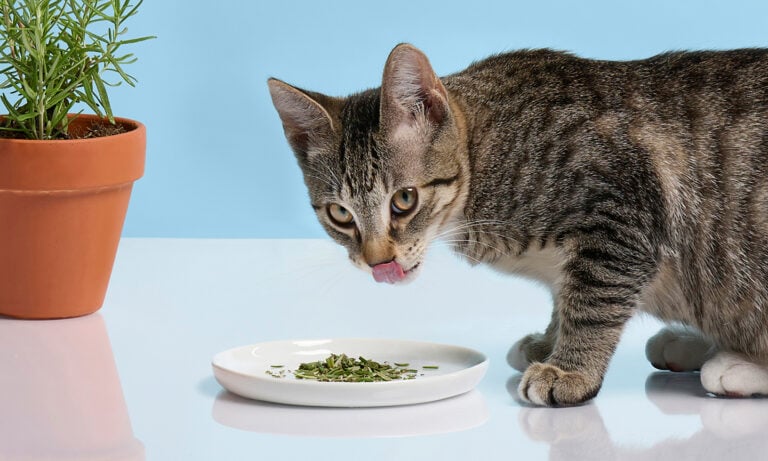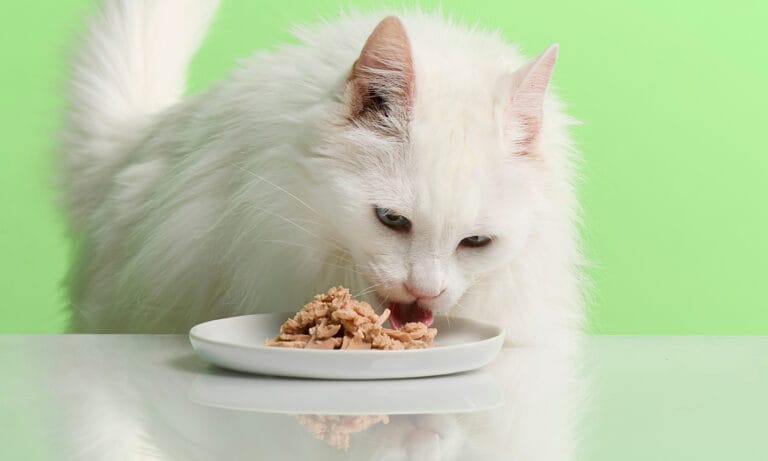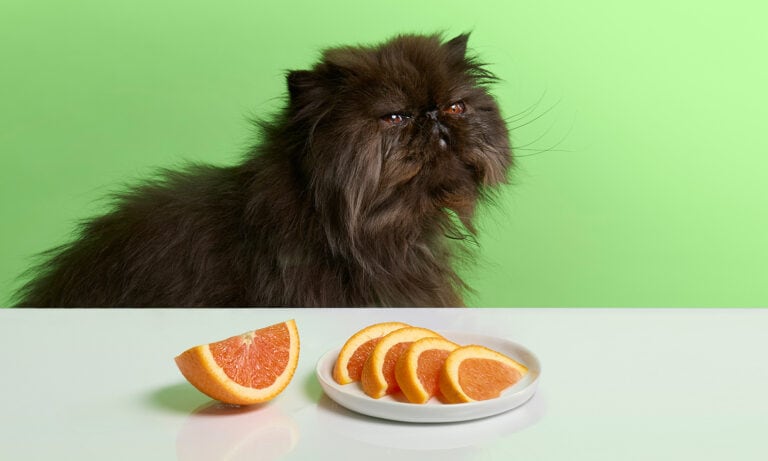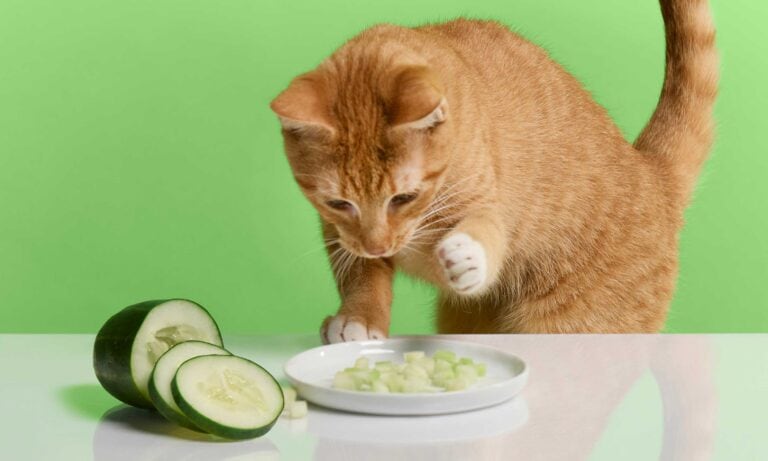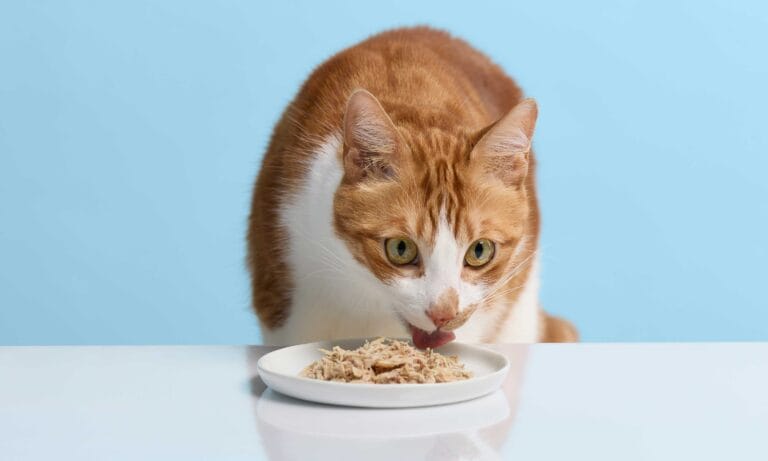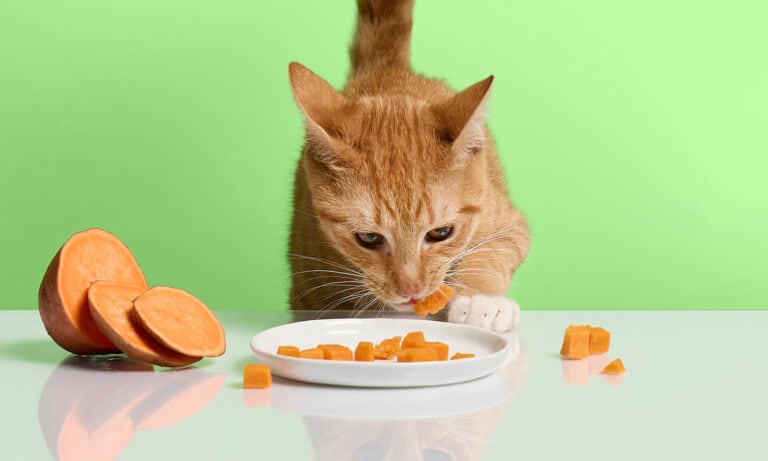As you whip up an omelet for breakfast and hear your cat meowing in the kitchen, you may wonder, “Can cats eat eggs?”
The short answer—yes! But there are a few things to be mindful of before sharing your plate of eggs with your kitty.
We spoke to a vet expert to learn more about the benefits and risks of feeding eggs to your cat and how to safely offer them as a healthy treat.
Expert input provided by Dr. Sabrina Kong, DVM, Certified Canine Rehabilitation Practitioner at Jules Veterinary Center in Tracy, California, and veterinary consultant at WeLoveDoodles.com.
Can Cats Eat Eggs?
Click to jump to each section.
Should Cats Eat Eggs?
How Much Egg Is Safe To Feed Cats
Because eggs add extra calories to a cat’s diet, it’s best to apply the 10 percent treat rule and feed them to your kitty only about once or twice a week. To put it into perspective, one egg is roughly 70 calories, which is nearly one-third of the daily caloric requirement for the average 10-pound cat.
Below is a breakdown of about how much cooked egg to feed a cat per serving based on the cat’s size:
- Extra-small (up to 5 pounds): 1 teaspoon
- Small (5-10 pounds): 1 teaspoon
- Medium (10-15 pounds): 2 teaspoons
- Large (15-20 pounds): 1 tablespoon
- Extra-large (over 20 pounds): 1 tablespoon
While we love spoiling our furry friends, eggs and other cat-friendly human foods should be considered as part of their total calorie intake and fed as an occasional treat to keep our felines happy and healthy.
If a cat eats too much egg, they may experience or develop:
- Gastrointestinal issues (such as vomiting, diarrhea or constipation)
- Unwanted weight gain
- Pancreatitis (inflammation of the pancreas)
Cats Who Shouldn’t Eat Eggs
Just like with humans, not every food—regardless of how healthy it is—may be a suitable choice for all cats. In some cases, eggs should be avoided if a cat:
- Needs to be on a special prescription diet
- Has specific health issues such as kidney disease or pancreatitis
- Has an egg allergy
- Is younger than 1 year old
If you’d like to feed your cat eggs or any other human food, consult your vet to find out if it’s a good choice based on your cat’s individual needs.
How to Safely Feed Eggs to Cats
Want to treat your cats to this egg-cellent snack? Here are some tips on how to safely feed eggs to your kitty:
- Fully cook all parts of the egg—yolk and whites. This prevents any risk of harmful bacteria like salmonella or E. coli, which can be present in raw eggs. The best-prepared methods for cats include scrambled eggs, boiled eggs and chopped eggs. (And toss the eggshells!)
- Keep the eggs plain. Avoid adding anything extra. Popular ingredients like oil, salt, seasoning and dairy products (such as butter and milk) can cause digestive issues in cats. Also, avoid sharing any eggs that you personally didn’t prepare, just to be safe.
- Incorporate them into your cat’s food. Make mealtime fun by adding egg as a meal topper on your cat’s kibble or mixing it in with their pet food.
- Feed an appropriate amount. Remember, eggs should be treated like treats; and treats should make up no more than 10 percent of your cat’s diet. So, give a small amount.
You can also try commercial cat food and cat treats that contain eggs as an ingredient, like the following:
Benefits of Eggs for Cats
Eggs are packed with nutritional benefits that both we and our kitty companions can enjoy.
The benefits of eggs for cats include the following:
- They’re high in protein. A single, medium-sized egg contains about 6 grams of protein—perfect for your kitty’s naturally animal-based protein diet.
- They’re great sources of vitamins and minerals. Eggs contain vitamins A, B6, B12, D and E, as well as iron, zinc, selenium and calcium, which are all beneficial to a cat’s immune system and health.
- They’re rich in omega-3 fatty acids and amino acids. These are essential for various bodily functions, such as heart and brain health and building protein, respectively.
Risks of Eggs for Cats
Despite their many health benefits, there are some risks and considerations to keep in mind when feeding your cat eggs.
Here’s what to watch out for:
- The risk of foodborne diseases: Salmonella or E. coli infections are a major concern with feeding eggs to cats, as they can cause food poisoning. If infected, cats may show signs, such as vomiting, diarrhea, lethargy and loss of appetite. However, Dr. Kong adds, cats may show less obvious signs or even none at all, making it difficult to diagnose these infections. To avoid this risk, make sure eggs are fully cooked before serving them to your cat.
- Biotin deficiency: This can occur from feeding too much raw egg white due to a protein called avidin that binds to biotin—or vitamin B7—and ultimately prevents the absorption of biotin. Cooking eggs thoroughly can eliminate this risk.
- Digestive issues: Kittens have a delicate digestive system. If fed eggs, it could lead to digestive issues like vomiting, diarrhea or constipation. Dr. Kong recommends sticking to a kitten-formulated diet while they’re still young. (They grow up so fast, you’ll be able to feed them eggs before you know it!)
- Too much protein: Some cats, particularly those who might have underlying kidney problems, may not be able to tolerate the high-protein content in eggs since it can be hard on their kidneys over time. (The same can apply to the eggs’ fat content and cholesterol.) It’s always a good idea to check with your vet before introducing new foods into their diet. If your cat has kidney disease, steer clear of eggs.
- Seasonings: Popular seasonings such as salt, pepper, garlic powder and onion powder are among some of the foods pets should never eat, as they can be harmful and even toxic to them. When prepping eggs for your cat, keep them plain.
- Obesity: Even if cooked and unseasoned, feeding too much eggs can lead to weight gain from the extra calories.
- Allergic reaction: Although it’s not very common, cats can develop allergies to any food, including eggs. Symptoms of a food allergy may include gastrointestinal upset (such as vomiting or diarrhea) or skin issues (such as itching, rashes or excessive grooming). Consult your vet if you notice your cat showing any of these signs.
FAQs About Eggs and Cats
Q:
Will cats eat eggs?
Q:
Do cats need eggs in their diet?
Q:
Can cats eat raw eggs?
Q:
Can cats have scrambled eggs? Should cats eat scrambled eggs?
Q:
When can cats eat eggs?
MORE HUMAN FOODS CATS CAN EAT:
Share:






